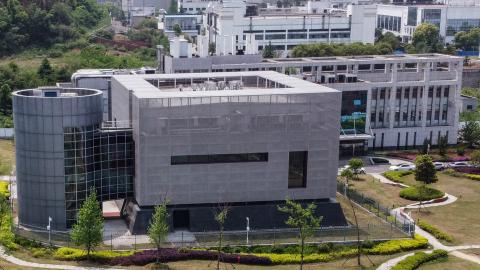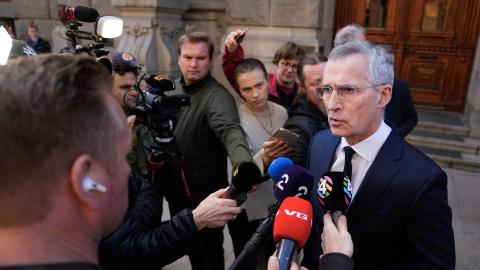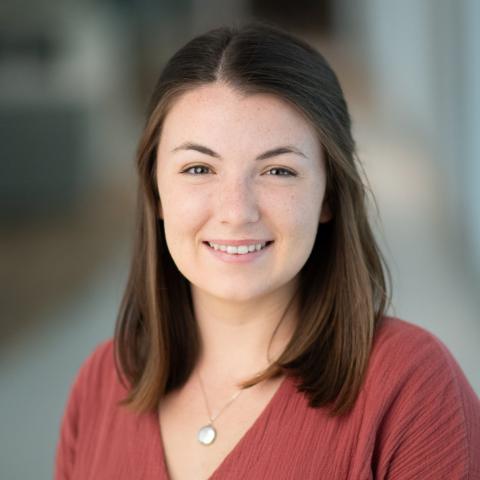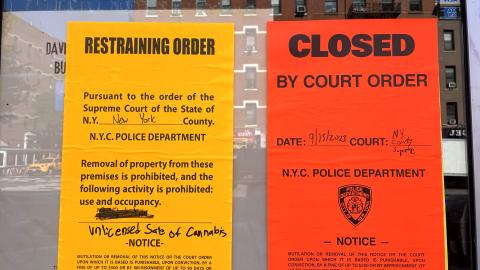“Equity is not a thing. It is the thing.”
With this unreadable statement, the architect of marijuana legalization in New York introduced the state’s Social and Economic Equity Plan for the budding cannabis industry.
Chris Alexander, who had been the lead drafter of the bill that legalized recreational marijuana in the Empire State, was appointed executive director of the state’s Office of Cannabis Management—one of the first appointments made by Governor Kathy Hochul after she took the reins from Andrew Cuomo.
“One of my top priorities is to finally get New York's cannabis industry up and running,” Hochul said after Alexander’s confirmation. But Hochul and her fellow Democrats didn’t just want to open dispensaries; they wanted particular people to sell weed to particular communities. After legalizing recreational cannabis in 2021, New York implemented a “social equity program” under Alexander’s direction, seeking to provide a head-start in the state-level industry to certain groups historically impacted by cannabis criminalization. The program gives preferential treatment to racial minorities, women, and convicted criminals, which the program calls “justice-involved individuals,” under the nebulous guise of equity.
In an attempt to effect reparations for the war on drugs, initial rounds of licensing were opened to individuals convicted of a marijuana-related offense or their family members. The first round of New York’s tiered cannabis licensing consisted of Conditional Adult-Use Retail Dispensary (CAURD) licenses, and guidelines stipulated that over half of CAURD license had to go to a “justice-involved” person. Upon receiving a license, individuals became eligible for a loan of $500,000 to $1.5 million and a retail space remodeled at the state’s expense.
At the outset, Governor Kathy Hochul designated $200 million to support businesses licensed under the social equity program. With this massive endowment, Alexander was bullish on the program’s prospects. In March 2022, he told the New York Times that he expected to distribute between 100–200 licenses to people who had been convicted of a marijuana-related offense.
Unlike any other part of the program, Alexander’s estimate proved far too conservative. CAURD has doled out at least three times as many cannabis licenses for ex-convicts than the 150 originally intended. In the summer of 2023 alone, New York’s Cannabis Control Board approved 212 additional licenses for former offenders, doubling the number of licenses given to individuals with former cannabis convictions in a matter of months. As of July, New York state had allowed 463 ex-convicts to become legal drug dealers.
Who are these former offenders? What exactly were their crimes? No one really knows—and, in the eyes of the state, you really shouldn’t be asking. New York has made sure that no one can get answers to these questions.
When the state legalized recreational cannabis, their policy included an automatic expungement of former cannabis-related convictions, meaning that marijuana crimes predating March 31, 2021 no longer appear on background checks and cannot be found by law enforcement unless the convicted individual is applying for a gun license or a law enforcement job. To make matters more confusing, the charges on record don’t always match the crime committed. The charge of cannabis possession often results from a plea bargain, which commonly occurs in situations where the offender is charged with a more serious crime, like trafficking. A drug dealer who pleaded down a sentence to possession is now able to pick up right where they left off, with the blessing (and funding) of the State of New York.
A few of these individuals became momentary media darlings, propped up by mainstream outlets as budding entrepreneurs whose dreams were no longer deferred. New York City resident Baron Fajardo, who had been arrested at age 16 for smoking marijuana, was subsequently arrested six additional times for both possession and distribution. Under the social equity program, Fajardo’s dealing would gain the government’s sanction.
“As a person you feel down, a little bit defeated, like ‘Oh, I got a stain on my name... Now, that stain is actually the same thing that can help you,” Fajardo told the New York Times.
Eager to give people like Fajardo the opportunity to get back in the game—and pay taxes this time around—the Cannabis Control Board heralded the program’s expansion as “a momentous leap forward in our pursuit of an inclusive and fair cannabis industry.”
But their enthusiasm wasn’t shared by all.
This August, a group of veterans filed a lawsuit arguing that regulators weren’t applying their equity plan equitably enough. Veterans and racial minorities had been promised special privileges alongside former “justice-involved individuals.” But when it came time to dole out the licenses, regulators limited the initial round of licensing to an applicant pool made up solely of individuals with former marijuana convictions.
These veterans aren’t the only ones confused about what exactly equity is—or isn’t. Activists pushed an anti-criminalization agenda for years, crafting a narrative of draconian enforcement built on systemic racism. The combination of national anti-police fervor and widespread misconceptions about marijuana’s social and medical dangers delivered an easy victory. But it seems that pro-cannabis politicians didn’t seriously consider what law and justice would look like in a marijuana-friendly state.
“Advocates fought hard to put racial equity at the center of New York’s cannabis legalization regime,” District Attorney Alvin Bragg of Soros funds and Trump trial fame said this February, expressing his disappointment at the proliferation of black-market storefronts throughout New York City. Never mind that black-market weed isn’t inspected or regulated—it frequently contains contaminants, heavy metals, and pesticides. No, Bragg was more concerned that the black market doesn’t live up to the “promise of equity and fairness” that he believes legalization offers to the industry.
Bragg teamed up with New York Mayor Eric Adams to take “direct action” against illegal dispensaries. Despite sendingwarning letters to over 400 illegal smoke shops in Manhattan, the dynamic duo shuttered only four—1 percent. Six months later, New York City is still home to over 1,500 unlicensed shops.
Now, pro-cannabis progressives find themselves in a tricky situation: After decrying the War on Drugs as a racist crusade, they’re beginning to realize that legalization hasn’t actually eliminated the need to enforce laws, even if New Yorkers now can light up legally. Equity is the thing, after all, and if equity means reparations for people who faced penalties for buying, selling, or using marijuana before 2021, does the same equity not extend to those who break the law now?



















